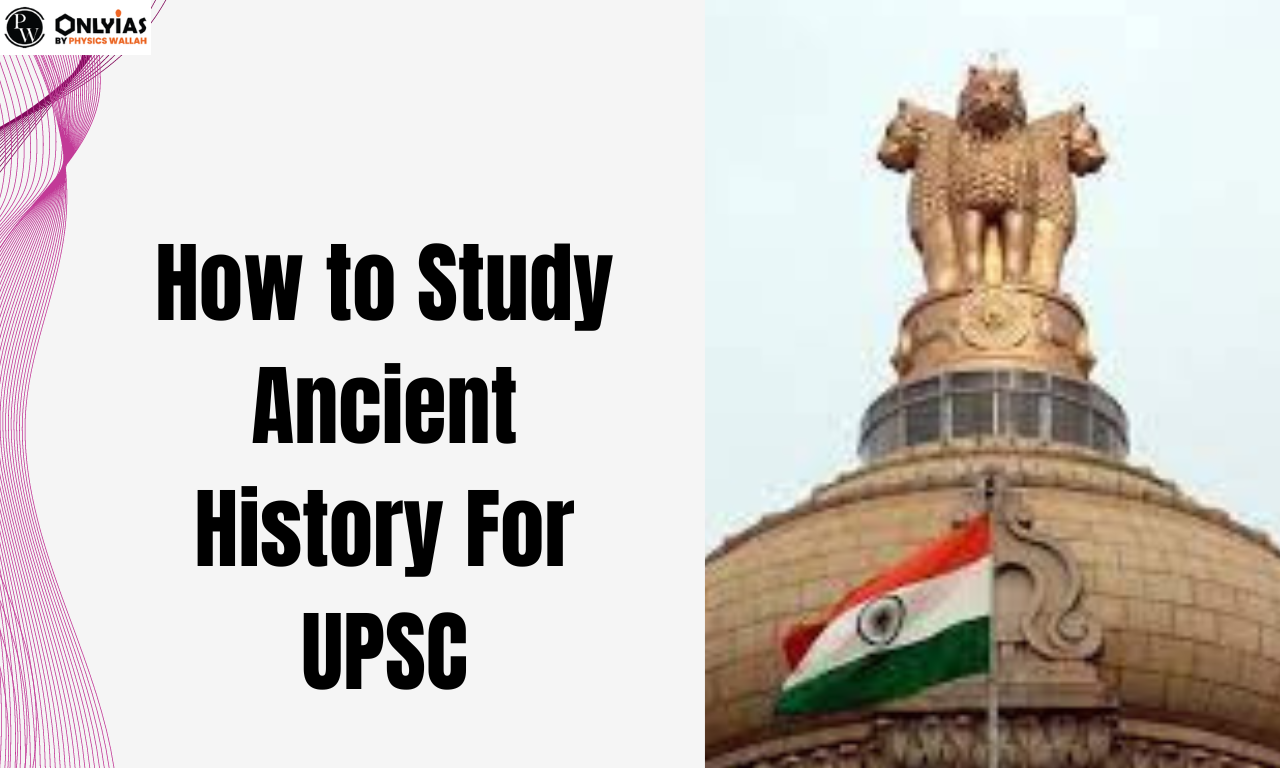Studying ancient history for the UPSC exam requires a well-structured approach that combines comprehensive coverage with focused analysis. Here's a step-by-step guide to help you study ancient history effectively

Ancient history plays a vital role in the UPSC examination, offering insights into the evolution of civilizations, cultures, and societies. To tackle this subject effectively, a well-structured strategy is essential. In this article, we will guide you through preparation, note-taking, and revision strategies for ancient history, along with highlighting the importance of the subject and significant topics.
Ancient History holds immense significance in the UPSC civil services syllabus, particularly in the UPSC prelims exam. Each year, the prelims paper features around 5 to 6 questions from this section. While some candidates tend to prioritize modern history, it’s crucial to remember that these 5 to 6 questions collectively play a substantial role in your overall UPSC score. In the grand scheme of the UPSC exam, where each mark counts, this section deserves your attention.
Also Read: How to Start Preparation For UPSC
NCERT (National Council of Educational Research and Training) textbooks hold immense value when it comes to studying ancient history for UPSC Exam. It provides a clear and concise introduction to ancient history topics. The NCERT textbooks are well-structured, presenting historical events in a chronological manner.
After thoroughly studying the NCERT textbooks for ancient history, it’s time to take your preparation to the next level. For your second reading, consider transitioning to more advanced and comprehensive textbooks. During this phase, approach the topics with a heightened awareness of subtleties. Aim to understand not only the chronological sequence of events but also delve deeper into the reasons behind these events and their subsequent impacts.
Preparing for the UPSC examination is a significant endeavor that requires meticulous planning, dedication, and a deep understanding of the exam’s intricacies. Opting for the right guidance during your preparation journey can make a substantial difference in your chances of success.
PWOnlyIAS is a leading UPSC coaching institute that provides aspirants with comprehensive guidance and resources for effective preparation. Their experienced faculty, structured study materials, mock tests, and personalized mentoring help candidates navigate the UPSC journey with confidence.
Preparing for the UPSC exam, especially the historical segment, can be a daunting task. Ancient history, a vital component of the syllabus, demands focused revision strategies to ensure a deep understanding and a higher rank on the leaderboard. Let’s delve into the art of revising ancient history for UPSC in a manner that guarantees success.
When preparing for the UPSC exam, focusing on specific topics can significantly enhance your understanding of ancient history. Pay special attention to sources of information, theories, art and culture, and the following crucial subjects:
Understand the types of sources available for ancient history, such as archaeological findings, inscriptions, literary texts, and artifacts. Analyze their reliability and limitations to derive accurate historical interpretations.
Study the methods used by historians to interpret ancient events and cultures, including the critical analysis of various theories.
Delve into the rich heritage of ancient Indian art and culture, including its evolution, symbolism, and influence on society.
Explore various forms of art, such as sculpture, architecture, painting, and crafts, and their connection to religious and social practices.
Understand the geographical spread, urban planning, trade, and technological advancements of this ancient civilization.
Analyze its writing system, social structure, religious practices, and decline.
Buddhism and Jainism:
Study the life and teachings of Gautama Buddha and Mahavira, their impact on society, and the spread of their respective philosophies.
Examine the core principles, practices, and symbolism associated with Buddhism and Jainism.
Explore the philosophical thought in ancient India through texts like the Vedas, Upanishads, and the six schools of philosophy (Nyaya, Vaisheshika, Samkhya, Yoga, Mimamsa, Vedanta).
Gain insights into the concepts of dharma, karma, moksha, and the debates surrounding these ideas.
Study the status of women in ancient Indian society, their roles, and contributions.
Analyze the caste system, professions, economic structure, and social hierarchy prevalent during that time.
Familiarize yourself with key terms and concepts relevant to ancient history, as they often appear in UPSC Prelims.
Dive into the political, social, and economic aspects of the Mauryan and Gupta dynasties.
Understand the administrative policies, cultural achievements, and their significance in shaping India’s history.
| UPSC Related Links | |
| UPSC Exam | UPSC Syllabus |
| UPSC Exam Date 2023 | UPSC Mains |
| IAS Full Form | IPS Full Form |
RS Sharma and NCERT books are best resources to prepare ancient history subject.
Begin by studying the NCERT textbooks. Once you've got a grip on those, check out the previous years' UPSC question papers. And don't forget to practice with lots of mock tests. This practical approach can boost your preparation and confidence.
<div class="new-fform">
</div>